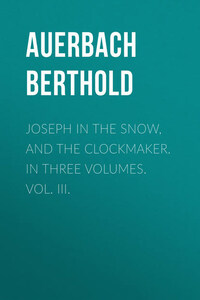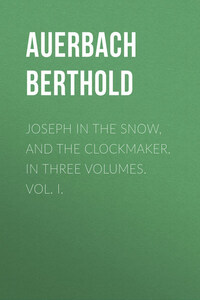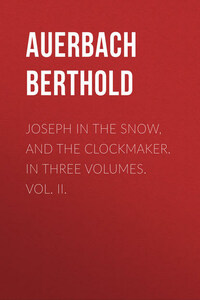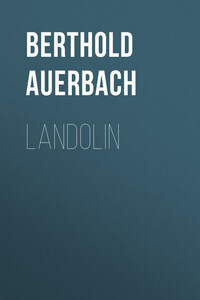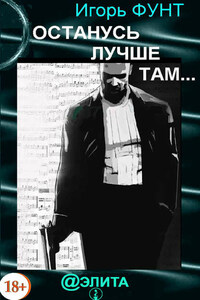CHAPTER XXIII.
THE FIRST NAIL KNOCKED IN, PEACE IN THE HOUSE, AND THE FIRST SUNDAY GUEST
Next day Annele seemed quite satisfied again with Franzl – she was such a capital servant, and Annele said: "I have not yet given you any thing, Franzl; do you prefer a gown or money?"
"I should like money best."
"There are two crown dollars for you."
Lenz was very much pleased when Franzl told him this – she is a spoiled, hasty, dear, good child, thought he – and Franzl's idea was: "She is like our young bailiff's wife at home, of whom the balancemaker's wife once said: She has always seven visitors in her head, but only six chairs, so one must always stand, or walk about, while the others are sitting down." Lenz laughed, and Franzl continued: "We Kunslingers are sharp enough, but see how nicely your wife has already put every thing into order; any one else would have taken three days to complete it, and stumbled at least seventeen times, and broken half the things into the bargain. Your wife is not left-handed."
Lenz told Annele that Franzl declared she had two right hands, and Annele was delighted with this praise. Annele now displayed a new qualification. Lenz begged her to put in a nail in the wall above his father's file. She hit the nail straight on the head, and Lenz hung up his mother's picture on the first nail that Annele had knocked in at home. "So far well," said Lenz. "Even if it is not quite her own face, still these are her own eyes, which, please God, shall look down on a peaceful, good, and happy life in this house. Let us always live, so that my mother can gaze at us with satisfaction."
Annele was on the point of saying: "Oh! pray don't make a pattern saint of the good woman;" but she gulped it down.
The whole week – it was now only Wednesday – was kept like a half holiday; Lenz worked for a couple of hours, but, apparently, only to remind him of his calling; and he was always in better spirits after he had been busy at work. The various events, during the marriage festivities, were naturally recalled and commented on. It was certainly not a little amusing to hear the way in which Annele could imitate and quiz them all. The landladies of the "Bear," the "Lamb" and the "Eagle," were to the very life; Faller in particular she could take off exactly, in the way in which he constantly stroked his moustaches, till one could almost have believed that there were the same appendages on Annele's pretty mocking face. She intended no malice in these tricks – but she enjoyed any kind of fun, and was always well amused at the Carnival merry making, and now nothing but good humour shone forth, and she exclaimed: "Oh! how agreeable it is here in the hills, and how still and quiet! I had no idea that there could be such perfect peace. When I am seated here, and see and hear nothing of the world, and have no one to give an answer to, I almost feel as if I were sleeping with my eyes open – and sleeping pleasantly too; below there, it is like being constantly in a busy mill; up here, it is like another existence: I think I could actually hear my heart beat. I will not go down into the village for the next fortnight; I will accustom myself by degrees to give up going there, and it will be no hardship to me; they have no idea below there what enjoyment there is in being out of the bustle, and strife, and tumult of life. Oh Lenz, I don't think you know how fortunate you have been all your life!"
Annele was seated one morning beside Lenz, uttering all these exclamations of happiness and contentment, and the husband replied, with a glad face: "This is just as it should be; I knew you would like this house; and, believe me, I feel thankful to God, and to my parents, that I have been permitted to pass my life hitherto here. But, my dear little wife, we must not remain here for fourteen days, cut off from everybody. At all events, we must go to church together next Sunday; indeed, I think that we ought to go to see your parents for a little today."
"Just as you like; and, fortunately, we don't take with us the delightful peace we enjoy here, but we find it awaiting us when we come home again. I cannot realize that I have been here so short a time, it seems to me as if I had lived up here all my life; indeed, such quiet, happy hours count for as much as years elsewhere."
"You explain everything so well, you are so clever. Recall this feeling, if the day comes when you find it dull up here. Those people, who would not believe that you could be happy in solitude, will be surprised."
"Who refused to believe that? No doubt it was Pilgrim, that great artist: a pretty fellow he is; if he does not find angels, he immediately fancies them devils; but, I tell you fairly, he shall never come under this roof."
"Pilgrim said nothing of the sort. Why will you persist in having some particular person to hate? My mother said a hundred times over, the only way to have peace of mind, is to think well of your fellow creatures. I wish she had lived even a year longer, that you might have profited by her wisdom. Was it not well said? You understand everything. When we hate a man, or know that we have an enemy – I never knew the feeling but once in my life and it was terrible indeed – we feel, no matter where we go, or where we are, that an invisible pistol is aimed at our heads. My greatest happiness is, that I hate no one, and no one so far as I know, hates me."
